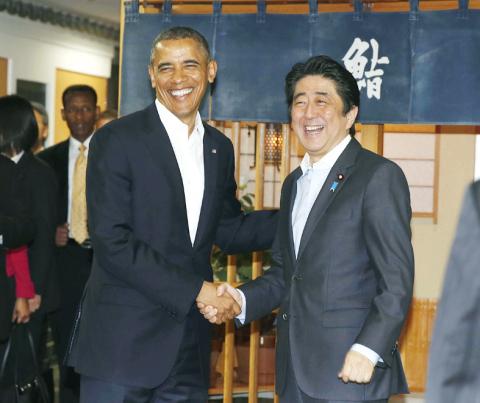US President Barack Obama confirmed yesterday that the US’ mutual security treaty with Japan applies to the islands at the center of a territorial dispute between China and Japan.
“The policy of the United States is clear,” he said in a written response to questions published in the Yomiuri Shimbun before his arrival in Tokyo at the start of a four-country Asia tour.
“The Senkaku Islands are administered by Japan” and therefore fall under the US-Japan treaty, he wrote. “And we oppose any unilateral attempts to undermine Japan’s administration of these islands.”

Photo: Reuters
His statement seems aimed at reassuring Japan that the US would come to its defense if China were to seize the islands, known in Taiwan as the Diaoyutai Islands (釣魚台) and in China as the Diaoyu Archipelago (釣魚群島).
Russia’s annexation of Crimea has sparked concern about the US’ political will to protect Asian allies, notably in Japan and the Philippines.
A Chinese government spokesman responded that China has “indisputable sovereignty” over the islands, and said “the so-called Japan-US alliance” should not harm China’s territorial rights.
“We firmly oppose applying the Japan-US security treaty in the issue of the Diaoyu Islands,” Chinese Ministry of Foreign Affairs spokesman Qin Gang (秦剛) said at a regular briefing.
“The US should respect facts, take a responsible attitude, remain committed to not taking sides on territory and sovereignty issues, speak and act cautiously, and earnestly play a constructive role in regional peace and stability,” he added.
Obama told the Yomiuri the US is deepening its ties with China, but “our engagement with China does not and will not come at the expense of Japan or any other ally.”
He said the US will continue to take steps to reduce the impact of its military presence in Okinawa, but added: “It’s important to remember that the US Marine Corps presence on Okinawa is absolutely critical to our mutual security. It plays a key role in the defense of Japan.”

TRAGEDY STRIKES TAIPEI: The suspect died after falling off a building after he threw smoke grenades into Taipei Main Station and went on a killing spree in Zhongshan A 27-year-old suspect allegedly threw smoke grenades in Taipei Main Station and then proceeded to Zhongshan MRT Station in a random killing spree that resulted in the death of the suspect and two other civilians, and seven injured, including one in critical condition, as of press time last night. The suspect, identified as a man surnamed Chang Wen (張文), allegedly began the attack at Taipei Main Station, the Taipei Fire Department said, adding that it received a report at 5:24pm that smoke grenades had been thrown in the station. One man in his 50s was rushed to hospital after a cardiac arrest

SAFETY FIRST: Double the number of police were deployed at the Taipei Marathon, while other cities released plans to bolster public event safety Authorities across Taiwan have stepped up security measures ahead of Christmas and New Year events, following a knife and smoke bomb attack in Taipei on Friday that left four people dead and 11 injured. In a bid to prevent potential copycat incidents, police deployments have been expanded for large gatherings, transport hubs, and other crowded public spaces, according to official statements from police and city authorities. Taipei Mayor Chiang Wan-an (蔣萬安) said the city has “comprehensively raised security readiness” in crowded areas, increased police deployments with armed officers, and intensified patrols during weekends and nighttime hours. For large-scale events, security checkpoints and explosives

PUBLIC SAFETY: The premier said that security would be tightened in transport hubs, while President Lai commended the public for their bravery The government is to deploy more police, including rapid response units, in crowded public areas to ensure a swift response to any threats, President William Lai (賴清德) said yesterday after a knife attack killed three people and injured 11 in Taipei the previous day. Lai made the remarks following a briefing by the National Police Agency on the progress of the investigation, saying that the attack underscored the importance of cooperation in public security between the central and local governments. The attack unfolded in the early evening on Friday around Taipei Main Station’s M7 exit and later near the Taipei MRT’s Zhongshan

A car bomb killed a senior Russian general in southern Moscow yesterday morning, the latest high-profile army figure to be blown up in a blast that came just hours after Russian and Ukrainian delegates held separate talks in Miami on a plan to end the war. Kyiv has not commented on the incident, but Russian investigators said they were probing whether the blast was “linked” to “Ukrainian special forces.” The attack was similar to other assassinations of generals and pro-war figures that have either been claimed, or are widely believed to have been orchestrated, by Ukraine. Russian Lieutenant General Fanil Sarvarov, 56, head